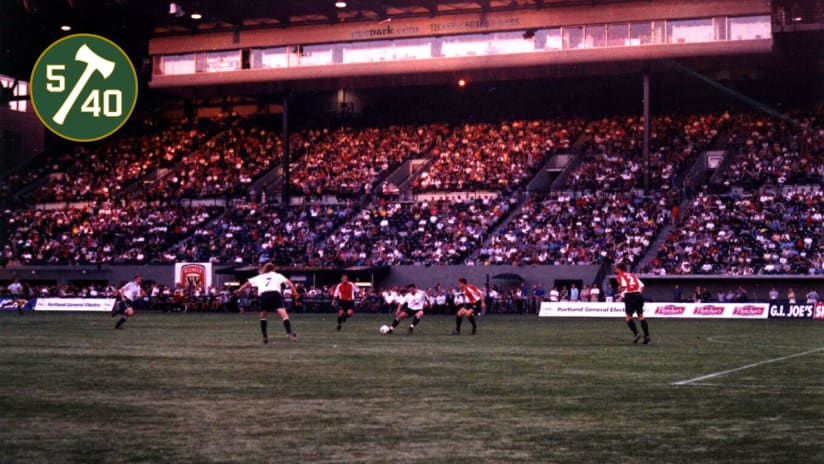It was mid-July, 2000 when the announcement came. The Portland Timbers, a name with tremendous resonance in the Portland soccer community, were coming back for the 2001 A-League season.
"This is an exciting day for our region’s soccer fans," said then-Timbers general manager Jim Taylor in a press release announcing the team's return. “After talking with soccer fans, soccer leaders, and many of the former Timbers still residing in Portland today, it was an enthusiastic thumbs up to bring back a name that is synonymous with the highest level of professional outdoor soccer in Oregon."
"It's been so long—18 years—why not?" NASL Timbers great Willie Anderson pointedly asked the Oregonian.
As the team geared up for its first season, it brought back elements from the NASL days like Civic Stadium, Timber Jim and even a British identity in the form of head coach Bobby Howe. It was all part of the team's effort to recapture the imagination of Portland's soccer fans.
And it worked.
“It wasn't the scale that you're enjoying today,” noted then-team president Marshall Glickman. “But it certainly was of the same intensity for those that were a part of it.”
But the club had ambitions beyond just growing the fan base.
“We were able to put together a team based upon all those areas of observation, but not an easy process!” exclaimed former coach Howe. “You're given a blank sheet and you say: 'OK, you've got no players right now.' Put together a team in the next six months.
“We worked very, very hard for six months, before the team kicked a ball in earnest in 2001, to put together a group of players that we hoped were going to be competitive,” Howe continued. “I thought we were pretty competitive in the first year.”
The USL inaugural roster included some names that Timbers fans may well remember: forward Mark Baena (team-leading 13 goals), Keith Costigan (current television soccer analyst), Scott Benedetti (local product of the University of Portland), Gavin Wilkinson (current Timbers GM), Brent Sancho (member of the 2006 Trinidad & Tobago World Cup team and current Minister of Sport for T&T), and Michael O’Neill (current manager of the Northern Ireland national team).
“You have a blank slate,” said Howe. “You've seen these players play but you don't really know their personalities. You don't really know how they'll react to situations in games, both positively and negatively. We really had to learn all that in the first season.”
It wasn't the most ideal start, however, as the Timbers lost their first-ever USL regular season match 2-1 in extra time to the El Paso Patriots. Soon, though, the results started coming. The Timbers opened their first home match at the newly re-named PGE Park with a 2-0 victory over rivals Seattle Sounders, before winning five of their next six USL matches. By season's end, the nascent team had qualified for the playoffs with a record of 13 wins, 10 losses, and three draws.
Howe was unsurprised by the team's growing support from the Portland community.
“I knew that from the North American Soccer League days [when Howe was a player] that Portland was a soccer city. The enthusiasm was there...I thought if we could put an entertaining product on the field then people would come.”
The 2001 season ended on a bittersweet note. The Timbers advanced out of the first round of the playoffs, defeating the Charlotte Eagles 5-2 on aggregate, but were eliminated in the next round, 3-0 on aggregate, by the Hershey Wildcats.
“It was a disappointing end to what was a very promising first season,” Howe reflected.
What Howe saw that first season, though, was much more encouraging: the re-birth of Soccer City, USA.
“The support that we received was better than most other franchises in the USL at that time,” he said. “The support was vociferous [and] that hasn't changed. The crowds, the numbers that we were getting, were outstanding. I think the players appreciated that because the atmosphere was fantastic. That was always nice, knowing you were going to a home game with a crowd that was incredibly supportive.”












